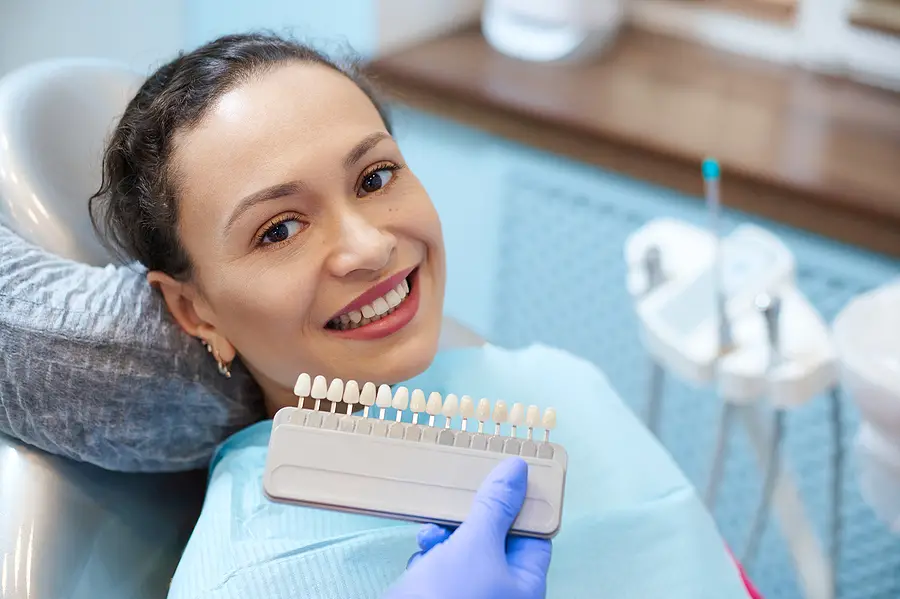Newsletter
Thank you for subscribing.
You have already subscribed.
Posted by - Dental clincidubai -
on - Jun 2 -
Filed in - Health -
Dental Veneers Dental Veneers dubai Dental Veneers cost -
105 Views - 0 Comments - 0 Likes - 0 Reviews

For many seeking a confident smile, dental veneers in Dubai offer a popular cosmetic solution. Veneers can transform stained, chipped, or misaligned teeth into a flawless set of pearly whites. However, some patients experience sensitivity either during or after the veneer procedure. Understanding what causes this sensitivity and how to manage it effectively ensures a comfortable and satisfying veneer experience.
Sensitivity related to dental veneers is often temporary but can vary depending on several factors. Common causes include:
Enamel Removal: Preparing a tooth for veneers requires removing a thin layer of enamel, which may expose the dentin and trigger sensitivity to temperature or pressure.
Bonding Process: The adhesives and etching involved in securing veneers can irritate the tooth surface or gums temporarily.
Tooth Trauma: The procedure itself may cause minor inflammation or trauma to the tooth’s nerve.
Existing Tooth Conditions: Teeth with pre-existing enamel erosion, cavities, or gum recession may be more prone to sensitivity post-treatment.
Recognizing these causes helps patients manage their expectations and communicate effectively with their dentist.
Dental sensitivity after veneer placement can manifest in different ways:
Thermal Sensitivity: Sharp discomfort or pain when consuming hot or cold foods and beverages.
Mechanical Sensitivity: Sensitivity to touch or pressure, such as when brushing or biting.
Chemical Sensitivity: Reaction to acidic or sugary substances.
Gum Sensitivity: Tenderness or irritation in the gum tissues surrounding the veneers.
Most sensitivity cases are mild and resolve within days to weeks as the tooth adjusts.
The duration of sensitivity varies based on individual factors and treatment specifics:
Sensitivity typically peaks within the first few days after veneer placement.
Most patients experience a gradual decrease in discomfort within 1 to 3 weeks.
Persistent sensitivity beyond one month may indicate an underlying issue requiring professional evaluation.
Proper care and communication with your dentist can ensure timely resolution.
Several at-home strategies can alleviate veneer-related sensitivity:
Use toothpaste for sensitive teeth that contains potassium nitrate or fluoride.
Avoid extremely hot, cold, acidic, or sugary foods and drinks initially.
Use a soft-bristled toothbrush and gentle brushing technique to reduce gum irritation.
Rinse with a fluoride mouthwash to strengthen enamel and soothe nerves.
Maintain good oral hygiene to prevent gum inflammation and secondary sensitivity.
These simple habits support comfort during the adjustment period.
If sensitivity persists or worsens, it is important to consult your dentist promptly. Warning signs include:
Severe or sharp pain that interferes with daily activities.
Sensitivity lasting longer than 4 weeks.
Swelling, redness, or bleeding around the veneer site.
Loose or damaged veneers.
Your dentist may recommend treatments such as desensitizing agents, adjusting the veneer fit, or further dental work to address underlying problems.
Preventive measures taken before and during the veneer process can minimize sensitivity risks:
Comprehensive dental examination to identify and treat pre-existing conditions.
Minimizing enamel removal with advanced no-prep or minimal-prep veneer techniques.
Using biocompatible bonding agents and gentle etching protocols.
Providing patients with detailed post-procedure care instructions.
Choosing an experienced cosmetic dentist in Dubai enhances the likelihood of a smooth, sensitivity-free veneer experience.
Modern dental clinics offering dental veneers in Dubai utilize advanced technology that helps reduce sensitivity:
Digital impressions and smile design software minimize procedure time and trauma.
Laser dentistry can prepare teeth with less discomfort and more precision.
Newer adhesive systems provide strong bonds with less irritation to the tooth pulp.
Customized veneers ensure a precise fit, reducing pressure and irritation.
These technological improvements significantly improve patient comfort during and after treatment.
Long-term care is essential to maintaining both the appearance of veneers and minimizing sensitivity:
Avoid biting hard foods, ice, or non-food objects to prevent veneer damage.
Limit intake of acidic and sugary beverages to reduce enamel erosion.
Wear a mouthguard if you grind your teeth at night to protect veneers.
Keep regular dental appointments for professional cleaning and veneer assessment.
Maintain a balanced diet rich in vitamins and minerals to support oral health.
Adopting these habits preserves your smile and reduces sensitivity risks over time.
Sensitivity related to dental veneers is a common and usually temporary experience for many patients, especially when receiving dental veneers in Dubai. Understanding the causes—from enamel removal to bonding processes—and knowing how to manage discomfort at home helps ensure a positive outcome. Preventive care, advanced dental technology, and expert clinical techniques all play a crucial role in minimizing sensitivity. If managed properly, dental veneers not only improve your smile’s appearance but also provide long-lasting comfort and confidence.

Our Mission... “To assist disaster survivors by providing a source for them to come together in time of need, to aid in the listing of events, information and other forms of assistance, and continuing support through the recovery process.”

Share this page with your family and friends.